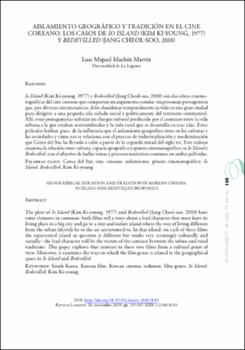Aislamiento geográfico y tradición en el cine coreano: los casos de Io Island (Kim Ki-young, 1977) y Bedevilled (Jang Cheol-soo, 2010)
Author
Machín Martín, Luis MiguelDate
2020Abstract
Io Island (Kim Ki-young, 1977) y Bedevilled (Jang Cheol-soo, 2010) son dos obras cinematográficas
del cine coreano que comparten un argumento común: un personaje protagonista
que, por diversas circunstancias, debe abandonar temporalmente su vida en una gran ciudad
para dirigirse a una pequeña isla aislada social y políticamente del territorio continental.
Allí, estos protagonistas sufrirán un choque cultural producido por el contraste entre la vida
urbana a la que estaban acostumbrados y la vida rural que se desarrolla en esas islas. Estas
películas hablan, pues, de la influencia que el aislamiento geográfico tiene en las culturas y
las sociedades y cómo eso se relaciona con el proceso de industrialización y modernización
que Corea del Sur ha llevado a cabo a partir de la segunda mitad del siglo xx. Este trabajo
examina la relación entre cultura, espacio geográfico y género cinematográfico en Io Island y
Bedevilled, con el objetivo de hallar temas y procesos narrativos comunes en ambas películas. The plots of Io Island (Kim Ki-young, 1977) and Bedevilled (Jang Cheol-soo, 2010) have
some elements in common: both films tell a story about a lead character that must leave its
living place in a big city and go to a tiny and isolate island where the way of living different
from the urban lifestyle he or she are accustomed to. In that island –in each of these films
the represented island in question is different but works very seemingly culturally and
socially– the lead character will be the victim of the contrast between the urban and rural
traditions. This paper explores that contrast in these two films from a cultural point of
view. Moreover, it examines the ways in which the film genre is related to the geographical
space in Io Island and Bedevilled.





